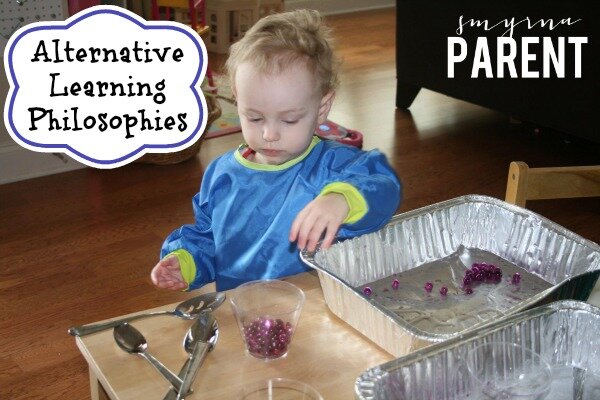
I think I’m figuring out I’m an alternative kind of person. I never really knew this until I had children. I didn’t know I was an attachment parent (with “alternative parenting choices”) until my daughter was almost a year old, and even as an educator I never realized how far from the norm my educational philosophy fell until my daughter started approaching school age.
We’ve always known we were going to home school (or at least give it our best shot), and have always been drawn to what are considered alternative education styles – Waldorf, Reggio, Montessori. Not sure what those are? Start with this – if the normal American classroom routine/schedule/expectations don’t feel right to you, and the private school options you’ve explored don’t feel much better, you’re probably alternatively minded when it comes to schooling, too. So here you go, a simplistic explanation of a few less-than-standard philosophies that might suit you and your child just right.
Montessori
Most people have at least heard of Montessori education. This style focuses on independence, exploratory learning, and freedom (with limits). True Montessori schools are recognized by an accredited institute and have teachers that have gone through a specific program and are properly certified. If you were to visit a Montessori classroom, you would notice mixed ages, large rooms, and plenty of materials organized in specific ways. Some of the materials might look unusual, not like any classroom materials you’ve ever seen – Montessori schools use specialized materials designed specifically for this method of education. Hands on exploration is key, and children are given large blocks of time during the day to explore and focus on materials available in the classroom (versus the direct instruction model found in traditional classrooms). The environment is set up to suit the developmental needs of the age group of children, and no materials are available that are not directly supportive of age appropriate development. Materials are generally presented by the teacher to the group of children, and the children are then free to explore independently.
The nearest Montessori schools:
Smyrna Montessori School (Smyrna)
Riverstone Montessori Academy (Marietta)
Waldorf
Waldorf curriculum is designed to meet the developmental stages of children, and Waldorf teachers strive to create enthusiasm for learning. Early education is all about inspiring the imagination, and you will find plenty of imaginary play, puppetry, finger plays, singing, painting and creating models with natural materials, baking, nature walks, and seasonal celebrations. Elementary school children stay with their teachers for 8 years. Many people perceive Waldorf education as a delayed education (one example: children do not begin learning to read until they are 6+ years old), rather, the Waldorf model works very closely with developmental readiness.
Unfortunately, the only Waldorf school in the Atlanta area is in Decatur: The Waldorf School of Atlanta
Reggio Emilio
The Reggio approach focuses on child-guided curriculum and focuses on the principles of respect, responsibility and community. It recognizes children as the intelligent beings they are, and encourages them to share and develop to their fullest potential. Reggio educators believe children should play a role in determining the direction of their education, and should have plenty of opportunities to express themselves. Project based education is very typical. Relationships are very important in Reggio settings, too – child to child, child to teacher, the family, and the community. Think toward the concept of ‘it takes a village’. Teachers are more facilitators, developing activities based on the children’s interests and working together as co-learners. Documentation is very important to this approach, and you will find Reggio teachers very busy taking photos, journaling, and compiling information. Reggio classroom spaces are open, generally use natural light, and have plants all around. They are designed to encourage interaction and community, as is the standard to keep children in the same groups and with the same teacher for 3 years.
The 3 Atlanta-area Reggio schools are:
Grant Park Cooperative Preschool (2 locations: Grant Park and Cabbagetown)
Turning Sun School (2 locations: Clairmont Rd./Atlanta and Hosea L. Williams/East Lake)
St. Anne’s Day School (Northside & Moore’s Mill/Atlanta)
Contributor Bio: Annie is a work from…wherever…mom to 2 beautiful kiddos. She spends her days finding that balance between running the household and managing her after school enrichment company, Creative Learning Atlanta.
Our other education-related posts for the month include:
- Local PMOs and Preschools
- Information on the proposed Cobb Charter School
- Moms for School Choice
- Developing a Teaching Spirit in your Child
Latest posts by Alicia (see all)
- Raising Money-Smart Kids in a Digital World: A Parent’s Guide to Bitcoin, Budgets, and Better Habits - October 5, 2025
- How Supporting Your Family Through Sports Builds Stronger Bonds - September 17, 2025
- Raising Resilient Kids in a Modern World: Lessons from Life and Lifestyle - September 9, 2025
